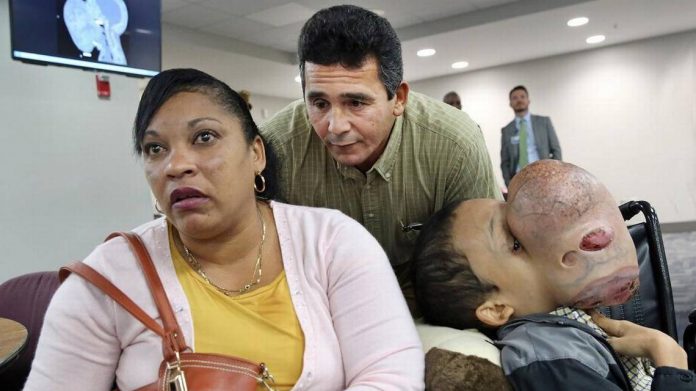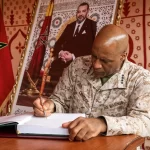Emanuel Zayas dies after undergoing surgery to remove 10-pound tumor from his face.
Zayas, 14, died Friday night, his doctors and relatives announced.
And the news of his death spread sadness through the social networks where many people had been tracking his progress from desperation to encouragement.
Dr. Robert Marx, head of maxilofacial surgery at the University of Miami Health System and the main doctor responsible for his care, said the Zayas family donated the boy’s remains to science, with the goal of learning more about the Polyostotic fibrous dysplasia that affected the boy for the past two years. The teen had been bought to Miami, where hopes had been focused on the city’s top-quality medical care; in Zayas’ native Cuba, it had been extremely difficult to find a way to remove the basketball-sized tumor.
“After visiting Emanuel last night and observing a ray of hope from his pupillary reflexes and the muscle tone of his face, I was informed this morning that his condition had turned grave,” Marx said in a statement. “I am saddened by the fact that we are losing him and that the physiological stress of the surgery was apparently too much for his compromised anatomy. Our hopes of saving his life, and with that allowing him a better quality of life, were not realized.”
Dr. Robert Marx, chief of oral and maxillofacial surgery for the University of Miami Health System, at a press conference discussing the removal of a 10-pound tumor on the face of Emanuel Zayas, 14, as his parents Melvis Vizaino and Noel Zayas listen in.
The tumor covering Zayas’ face had been benign, but it threatened to suffocate him because it pressed on his trachea. He was also malnourished because it made it difficult to eat and swallow. “The weight threatens his life,” Marx had said before the surgery. “If nothing is done, it could fracture his neck.”
The boy and his parents, Noel Zayas and Melvis Vizaino, both pastors of an evangelical church in the central Cuba city of Santa Clara, had flown to Miami Nov. 27 on a humanitarian visa. Missionaries from Reel Life International, a humanitarian nonprofit, had met the boy in Cuba and forwarded his case to Marx, who is experienced in the removal of large facial tumors.
Several benefactors had raised money for the procedure, launching an online donation platform and a Facebook page in the name of “Emanuel el Josue de este tiempo — Emanuel the Joshua of Our Time — which features photos of a smiling child riding a tricycle and then an older boy on a hospital bed holding up a drawing of the U.S. flag.
The page had more than 200 messages of condolences by Sunday morning on a post by Jaynie Estrada, a missionary who considers the Zayas family as her own and led the fund-raising effort.
“Thank you to everyone all over the world who donated, prayed and encouraged Emanuel,” Estrada wrote. “I translated and shared comments with him and his parents since the beginning of the campaign. Your interest, concern and love has impacted them deeply — and they love and appreciate you for it.”
“We are saddened and disappointed that Emanuel didn’t [have] the physical recovery we were hoping for,” she added. “However through the eyes of our faith, in our hearts, we truly believe and know without a doubt that Emanuel did indeed receive complete healing and that now he has a perfect, sweet face and two legs that work, and that he is running and jumping and having a great time in heaven right now.”
































